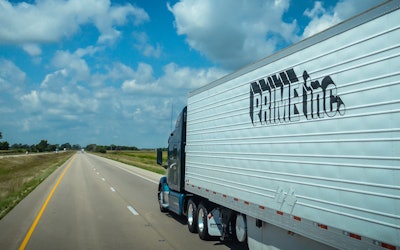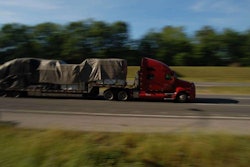
Lawmakers in the House and Senate return to Washington this week for the start of the first Congressional session of 2018, and a few hot issues related to trucking could see action in the coming weeks and months.
Though standalone trucking-related bills could see action, lawmakers likely will use larger bills — such as must-pass spending bills and a major infrastructure package — to enact trucking policy reforms.
Here’s a look at some of the trucking-related provisions likely to see action in Congress this session:
 A court ordered Walmart’s private fleet last year to pay $60 million in back wages to drivers for time spent off-duty, but in the sleeper berth. Moves in Congress could prevent such lawsuits and court orders.
A court ordered Walmart’s private fleet last year to pay $60 million in back wages to drivers for time spent off-duty, but in the sleeper berth. Moves in Congress could prevent such lawsuits and court orders.Stamping out state initiatives allowing breaks for drivers, pay reforms: Trucking trade groups last January signaled they intended to leverage Republican control in Washington to enact laws prohibiting states from requiring carriers to give drivers paid meal and rest breaks. The move would rein in states’ ability to interfere with drivers’ federally prescribed work schedules, seeking to reassert the federal government’s role in regulating drivers’ hours of service and protect carriers from expensive lawsuits. The provision, if passed, would also restrict states from requiring carriers to pay drivers for non-driving or off-duty time.
Work on the so-called Federal Authority provision, dubbed the Denham Amendment in years past, began in 2015 after a flurry of court rulings awarded drivers multi-million-dollar payouts from carriers. The driver plaintiffs in the case argued carriers hadn’t awarded them meal and rest breaks required by California law, and the courts mostly agreed and have ordered carriers to pay drivers, in some cases, tens of millions of dollars.
Speaking to CCJ last January, the Western States Trucking Association’s Joe Rajkovacz said the Federal Authority legislation is necessary to block court decisions that violate the spirit of the federal government’s authority over regulating drivers’ schedules and pay methods. The court rulings issued in recent years could create a wave of “me-too” lawsuits, he said. “It becomes legal blackmail against a small business: ‘Pay us or get sued and taken into court.”
The American Trucking Associations has also lobbied heavily for the Federal Authority provision lately, and it reiterated its support Tuesday in an email to members. ATA President and CEO Chris Spear said in the email that ATA is “making a full court press” for Congress to enact the Federal Authority language.
Those who oppose the Federal Authority measures say it would be a death knell for driver pay reform efforts ongoing at the state level.
The provision could be added as a policy rider to the government appropriations bills in the works in Congress — likely the best avenue for lawmakers to finalize the statute. A vote likely will come in January, says ATA, as lawmakers must act before the current stopgap government funding act expires January 19.
—
 Trump has said he hopes to use $200 billion in government spending to spur another $800 billion in private sector investment into U.S. infrastructure. Highway groups have said the plan would be limited in helping shore up needed infrastructure funding.
Trump has said he hopes to use $200 billion in government spending to spur another $800 billion in private sector investment into U.S. infrastructure. Highway groups have said the plan would be limited in helping shore up needed infrastructure funding.Infrastructure funding package: Some members of Congress and President Trump have signaled they intend to begin work on an infrastructure funding package early this year, hoping to follow up on finally passing a major piece of legislation, the Tax Cuts and Jobs Act, late last year.
Rep. Bill Shuster (R-Pa.), the chairman of the House’s Transportation and Infrastructure Committee, announced this week he’ll not be seeking reelection in 2018, intending instead to focus on producing and enacting an infrastructure funding bill.
Congress nor the president have provided many details on an infrastructure funding plan. But Trump, both as a candidate and as president, has said he hopes to draw investments from the private sector to bolster highway funding and other infrastructure projects. The U.S. has since the 1950s leaned on a per-gallon fuel tax to fund road and bridge projects. Trump, however, hopes to incentivize private investors with low-interest financing options and tax breaks. “Crumbling infrastructure will be replaced with new roads, bridges, tunnels, airports and railways, gleaming across our very, very beautiful land,” Trump said last year during an address to Congress.
Trucking groups, most notably ATA, have lobbied for an increase in fuel taxes, which haven’t been raised in about 25 years, to boost infrastructure funding, rather than leaning more heavily on private investments.
As noted by CCJ last March, greater privatization of U.S. roadways likely would mean an increase in the number of toll roads, particularly near urban centers.
—
Confirming FMCSA’s new boss: Trump’s nominee to head the Federal Motor Carrier Safety Administration, Raymond P. Martinez, is a Senate vote away from assuming his new position. A Senate committee voted unanimously to approve Martinez’s confirmation. But the full Senate must vote via a majority to confirm him as the next administrator of FMCSA.
—
CSA’s next steps: Though FMCSA withdrew last year a proposal to institute a new carrier rating system based on carriers’ percentile rankings within the Compliance, Safety, Accountability program’s Safety Measurement System, Congress could take steps to permanently block FMCSA from pursuing a Safety Fitness Determination rule until the agency has overhauled the existing CSA system.
The National Academies of Science, as directed by Congress in 2015, recommended a few key reforms for the program after studying it for a year. Moves in Congress could require FMCSA to implement those reforms before it can begin work on a new Safety Fitness rule. In 2015, Congress directed FMCSA to remove carriers’ CSA scores from public view, pending the NAS study and its recommendations for alterations to the program.
Read more about the NAS’ recommendations at this link. Like the Federal Authority provision, the CSA reform language could be tacked on to Congress’ appropriations bills as a policy rider.
—
ELD waiver for livestock haulers: The Senate introduced as a standalone bill late last year a bill to give livestock haulers additional time to comply with the federal government’s electronic logging device mandate. The bill, like other reforms, could be added to a larger piece of legislation and enacted.
FMCSA has already granted livestock haulers and others who haul ag commodities until mid-March to adopt an ELD. The bill in the Senate would give them until at least September to comply.
—
Expanding program for teen truckers: The House introduced in November a bill to expand an existing pilot program that allows CDL holders who are 18-21 years old the ability to drive interstate. Currently, interstate operation is limited to drivers 21 and older, though most states allow drivers younger than 21 to operate intrastate.
An existing pilot program established by 2015’s FAST Act highway bill allows truckers who are between 18 and 21 and are veterans of the military to drive interstate. The bill in the House would open the program up to all CDL holders, not just those who served in the military.
—
Requiring side underride guards: A bipartisan coalition of lawmakers introduced in both chambers in December a bill to require new trailers to be equipped with so-called side underride guards, which are meant to protect car occupants in crashes in which the car slides under a trailer.
The bill also would require the DOT to beef up standards for rear-impact underride guards, which are already required by federal law.










